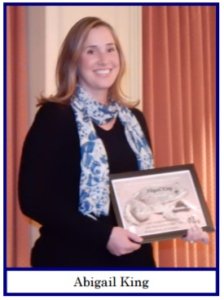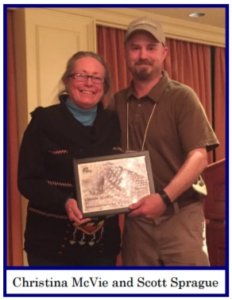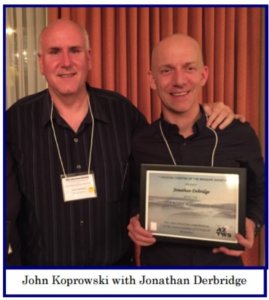The Arizona Chapter recognizes outstanding accomplishments in wildlife management, both by professionals and laymen, by bestowing awards at each year’s Joint Annual Meeting, held in February. We encourage our members to nominate deserving people or organizations for the awards, and as has been the case in the past, our chapter was privileged this year to receive numerous nominations for well-deserving individuals working in the wildlife management field. Below are summaries of each award, awardee, and the outstanding achievements for which they were nominated.
We congratulate all of our deserving 2015 awardees: Abigail King, David Brown, Christina McVie, Ray Schweinsburg, and Jonathan Derbridge.
Abigail King
Doug Morrison Award
The Doug Morrison Award is given in memory of Doug Morrison to an Arizona Biologist in a non-supervisory position who has made significant contributions to the management and conservation of wildlife in Arizona. This Award exemplifies the dedicated work ethic of the Chapter’s former President and U.S. Forest Service Biologist, Doug Morrison. Contributions are in areas of wildlife research, education and training, management, or law enforcement.
This year, the Doug Morrison Award was presented to Abigail King of the Arizona Game and Fish Department’s Amphibians and Reptiles Program. Her primary focus over the years has been Chiricahua leopard frog (CLF) recovery. She was responsible for establishing the first CLF metapopulations in the Chiricahuas since frogs were extirpated there some 30 years ago, orchestrating several habitat restoration projects to achieve that goal; and organizing functioning CLF metapopulations in the Dragoons and Galiuros. After years of attempts, Abi finally succeeded in establishing a breeding population of CLF in the White Mountains. She has also worked hard to reestablish Tarahumara frogs in the Santa Ritas. Most recently, Abi organized the return of Tarahumara frogs to Sycamore Canyon, where they had not been seen since 1974.
David Brown
Professional Service Award
The Professional Service Award is given to an Arizona biologist for outstanding contributions to management and conservation of wildlife. This individual is also recognized for their professional work standards and conduct. Contributions are in the areas of wildlife research, education and training, management, conservation, or law enforcement.
This year, the Professional Service Award was presented to David Brown. David is currently on the faculty at Arizona State University in the School of Life Sciences, but previously he worked for the Arizona Game and Fish Department as a Wildlife Manager in the Tucson Region, and as the Statewide Small Game Supervisor in Phoenix. David is one of the foremost naturalists and experts on wildlife and their habitats in the American Southwest and Mexico, and beyond. David was given this award because of his more than 60 years of professional contributions to our better understanding and appreciation of the biological world and our biological “sliding scale syndrome”. David always looks at the present by first starting with the past. He has become an expert on countless species of mammal and birds in Arizona and the habitats they once depended on. Few people have the depth of knowledge of the species as well as the plants and habitat types that they occupy and depend on, as David does. He has authored and co-authored many scientific publications, but the more important contributions to Southwest wildlife have been his documentation of declining trends in wildlife distribution and numbers.
Christina McVie
Conservation Award
The Conservation Award is given to a person, or persons, not employed directly as a wildlife biologist, or an organization not directly involved in wildlife management who contribute significantly to the conservation of wildlife and/or their habitat in Arizona. Conservation can include, but is not limited to research, education, legislation, and protection or enhancement of wildlife and their habitat.
This year’s Conservation Award was presented to Christina McVie. Christina has been a lifelong conservationist in Tucson, Pima County, and southeastern Arizona. She has been involved in local and regional land use planning and conservation efforts in southeast Arizona since 1996. Christina co-founded the non-profit organization Desert Watch. She mapped and helped to establish the Pima County Silverbell Mountain Park, which later became the Ironwood Forest National Monument.
She co-founded the Coalition for Sonoran Desert Protection, a leading conservation organization comprised of national, regional, local and neighborhood organizations, and has been the Chair of the CSDP Advisory Committee since 2005. She was a steering committee member and science contributor to the Sonoran Desert Conservation Plan. Christina was on the Pima County Multi-Species Conservation Plan Implementation Committee. She supported the formation of the Arizona Wildlife Linkages Working Group and participated in county-level Wildlife Linkage Workshops in Pima and Pinal counties. Christina was a Pima County Conservation Bond Advisory Committee Member. She has been the Conservation Chair for the Tucson Audubon Society since 2005. She has participated in the Pima Association of Government’s Regional Transportation Authority Wildlife Linkages Working Group since 2006. Christina is a Desert Landscape Conservation Cooperative Landscape Conservation Plan Design Working Group Member and co-author of the San Pedro Watershed DLCC LCD Pilot Proposal. In addition, she makes quite the contribution in keeping local/regional conservation planning initiatives current with the evolving ‘best available science’ as she frequently attends, at her own expense, regional and national professional science-based conferences always with the awareness of how that information can be shared and applied back home.
Ray Schweinsburg
Scrapping Bear Award
The recipient of the Scrapping Bear Award has gone beyond the normal call of duty in support of wildlife issues and has made exceptional contributions toward the management and protection of wildlife and habitat resources AND the recipient has stood up for what they thought was right, even if it was controversial or perceived as contrary to their agency’s official position, supervisor’s positions, or had the potential to put the recipients job on the line.
This year’s Scrapping Bear Award was presented to Ray Schweinsburg, a Contracts Supervisor with the Arizona Game and Fish Department. Among the many projects that he supervised over the years, Ray took a particular interest in habitat connectivity. Ray collaborated with a team of biologists focused on efforts of wildlife connectivity and wildlife-vehicle collision reduction. Some of the projects Ray was involved with included the world renowned State Route 260 wildlife crossings and US Highway 93 bighorn sheep overpasses. Ray also played a major role in collaborating on the Arizona Wildlife Linkages project, a document that has embedded itself in planning across Arizona and provided an opportunity to bring folks to the table to talk connectivity. Ray always fights hard for the best possible solution for wildlife, which in many cases has been met with resistance or even ridicule. Undaunted, Ray pushes forward with wildlife concerns at the forefront and on many occasions succeeds. Many states and countries look to Arizona as a model of successful collaboration in wildlife connectivity. Ray definitely earned some enemies and nonsupporters along the way but without his efforts wildlife connectivity in Arizona would not have reached the level that it is today and for that he has gained respect.
Jonathan Derbridge
Roger Hungerford Award
The Roger Hungerford Award is given to a student who, while attending an Arizona college or university, made significant contributions to the management and conservation of Arizona’s wildlife and/or habitat. Contributions are in the areas of wildlife research, education and training, management, conservation, or law enforcement. The Award is given in memory of one of Arizona’s finest research biologists, Roger Hungerford.
Jonathan Derbridge was the recipient of this year’s Roger Hungerford Award. Jonathan has established himself as a talented, hardworking, and motivated doctoral student who has worked extraordinarily hard to engage with agencies in his research, has been active in the national TWS, and has been productive with his research. He truly possesses a passion for learning and a strong desire to ‘really’ understand the topic at hand. His motivation is always a genuine enthusiasm for a topic and such enthusiasm is so very refreshing. This true interest in knowledge for the sake of knowledge typifies Jonathan’s approach to most anything that he attempts. Jonathan possesses well-developed written and oral communication skills, has strong quantitative and analytical abilities, and has mature critical thinking skills. He has continued to hone these skills and put them on display through about 10 presentations at AZTWS, National TWS and the International Wildlife Management Congress. Jonathan’s most important quality is his tenacious work ethic, which served him well as he undertook a challenging yet important research project.




